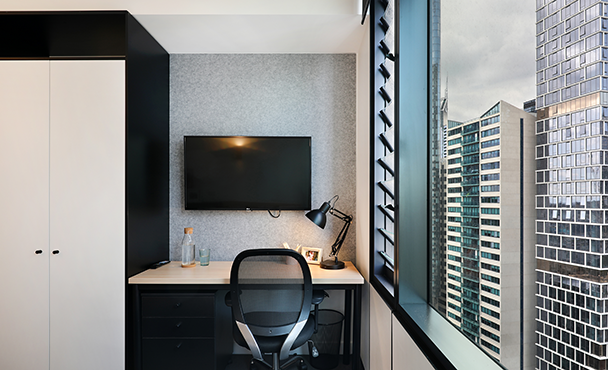The Iglu Guide | Blog
How to make your home study area work best for you

Now that we’re all familiar with working and studying remotely, it’s time to convert that once temporary solution into an inviting, productive and more permanent study space.
That little corner of the room with papers, pencils and half-empty coffee cups stacking up has reached its expiry date. It’s time to refresh your space with new strategies that boost focus, well-being, and efficiency.
Mark your area
No matter where you live, whether it’s an apartment, house or shared room, you will need to pick a spot that will become your permanent study space. If you’re lucky enough to have a private room with a desk, that’s perfect. But even in shared spaces, you can carve out a specific corner that becomes your go-to study hub.
Moving your books and laptop around daily and studying in different spaces can be distracting, disorientating – and time wasting. It’s ok to mix it up now and again with a library session or with friends, but it’s really important to keep that home study area consistent and available. Having a dedicated spot signals to your brain that it’s time to focus the moment you sit down.
Plan the space
Choose a study area that has plenty of access to natural light. This really helps lift your mood, enhance alertness, and provides a dose of Vitamin D. Position your desk to avoid direct glare and consider adding a warm-toned LED lamp to reduce eye strain, especially for evening study sessions.
Bringing nature indoors can also improve focus and reduce stress. Low-maintenance plants like spider plants, snake plants, or even a small hydroponic herb garden add a fresh, calming touch. And if you want to take it to the next level, biophilic design—incorporating natural elements like wooden textures, soft lighting, and greenery—has been linked to increased creativity and reduced stress.
Get ergonomic
There’s lots of information out there on how to have your computer best set up on your desk. With so many hours now spent online – and seated – that’s a lot of extra pressure placed on the back and neck area. Those little niggles have a nasty habit of turning into bigger niggles the longer we go on, so it makes perfect sense to get it right from the start and minimise the long-term effects on our physical posture.
Here are the main things to consider:
- Make sure your desk comes between your waist and ribcage
- Keep feet flat on the floor or use a footrest
- Position your screen so your eyes naturally align with the top third of the monitor
- Keep your arms at a 90º angle and use a separate keyboard and mouse
- An ergonomic chair is ideal with a lumbar support and adjustable height
- Consider a standing desk or a laptop stand to switch between sitting and standing
Ergonomic accessories like wrist supports, monitor risers, and blue-light-filtering glasses can also help make long study sessions more comfortable.
Stay organised!
If you think it’s easy to study efficiently in a mess, think again. It has been proven that the physical environment of a work area has a significant effect on our output. Not only are we wasting valuable time every time we misplace a document or file, the clutter and mess affects our stress and anxiety levels. It also impacts our ability to focus – and just the sight of all that clutter drains our brain power. Enough! Procrastinate no more and get yourself organised. There are plenty of accessibly-priced desk storage solutions at Kmart or Target that will help you feel on top of things. Stick to having only what you need on your desk and keep distractions—like your phone—out of reach during study periods.
Settle in
Your study space should be a reflection of you—somewhere that motivates and inspires. But while comfort is key, too much can be counterproductive. If lounging in your comfiest hoodie makes you want to nap instead of study, consider getting dressed as if you were heading to campus.
Personalise your workspace with motivational quotes, calming artwork, or soft LED strip lighting. Experiment with background music or white noise—some students focus best with instrumental playlists, while others work well in complete silence. Apps like Noisli or Brain.fm can help you find the perfect balance.
Upgrade with smart tech
Tech advancements make studying easier and more efficient. Smart notebooks, voice-to-text apps, and AI-powered study tools can streamline your workflow. Noise-cancelling headphones block out distractions, while blue-light filters on your screen reduce eye strain.
If you use multiple devices, consider a second monitor or tablet to boost productivity. Smart assistants like Google Nest or Alexa can help with reminders and timers to keep your study sessions on track.
Take regular breaks (and move!)
Breaks aren’t just a luxury—they’re essential for learning. Short, scheduled breaks help improve retention, boost creativity, and prevent burnout. Try the Pomodoro technique: 25-minute study sessions followed by 5-minute breaks, with a longer break after four cycles.
Movement is just as important. Whether it’s a quick stretch, a short walk, or some yoga, regular physical activity helps re-energise your body and mind. Switching up your workspace by standing for a while or using an under-desk treadmill can also help keep energy levels up.
Final thoughts
Your study space should work for you, not against you. By incorporating ergonomic setups, organisational strategies, and new tech trends, you can create an inviting and efficient workspace that keeps you focused and motivated. The best part about having a dedicated study area is that you can just put your pen down and leave – knowing that you can return at any time and simply pick back up where you left off.
Feature image: Standard Studio Apartment, Iglu Melbourne City


